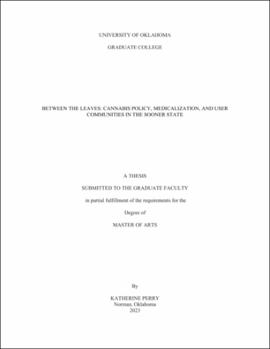Between the leaves: cannabis policy, medicalization, and user communities in the Sooner State
Abstract
This anthropological study uses an ethnographic approach to contextualize and explore the policy behind Oklahoma’s expansive medical cannabis industry and the lived experiences of user communities in the state. First, I conduct a history of cannabis policy in the United States to reveal the roots of the negative racial bias surrounding perceptions of cannabis. This bias was used as a tool by politicians throughout the 20th century to get votes by implementing anti-cannabis legislation. Next, I explore how politicians navigate the creation of cannabis policy in a conservative state where there is still a negative bias toward cannabis. In order to keep getting votes, politicians aim to appease their constituents and create ample opportunities for the state. By allowing cannabis to become medicinally legal in the state, politicians are able to satisfy conservative constituents by maintaining the stigma toward recreational cannabis while opening the state up to the lucrative economic opportunities offered by the medical cannabis industry. However, this medicalization is not rooted in biomedical practices. Given the state’s lenient regulations on medical cannabis, cannabis use on the ground occurs in both medical and recreational contexts. As a result, cannabis users and those employed in the industry are still subject to the negative stigma toward cannabis. Lastly, I explore how user communities navigate this stigma toward cannabis by normalizing its use through interactions and participation.
Collections
- OU - Theses [2186]
The following license files are associated with this item:

